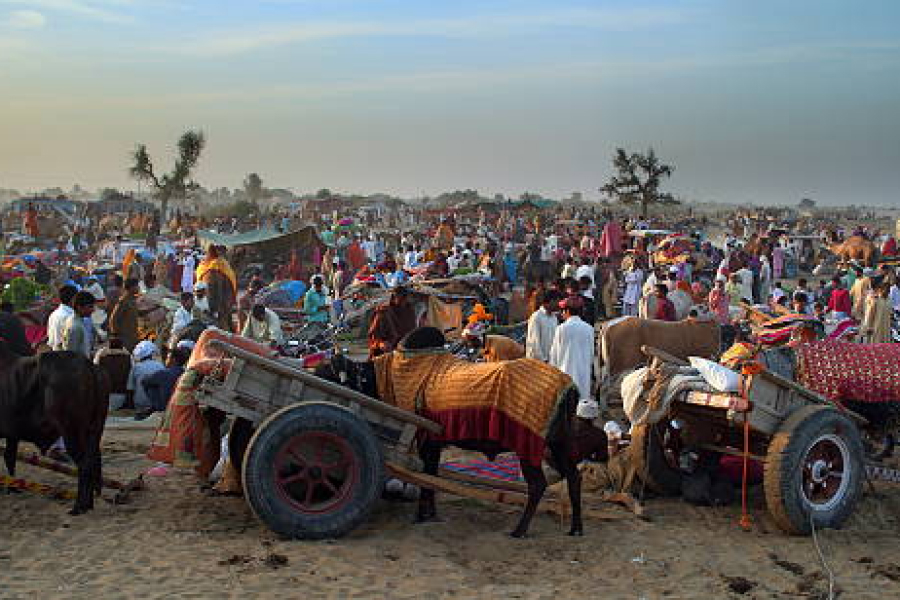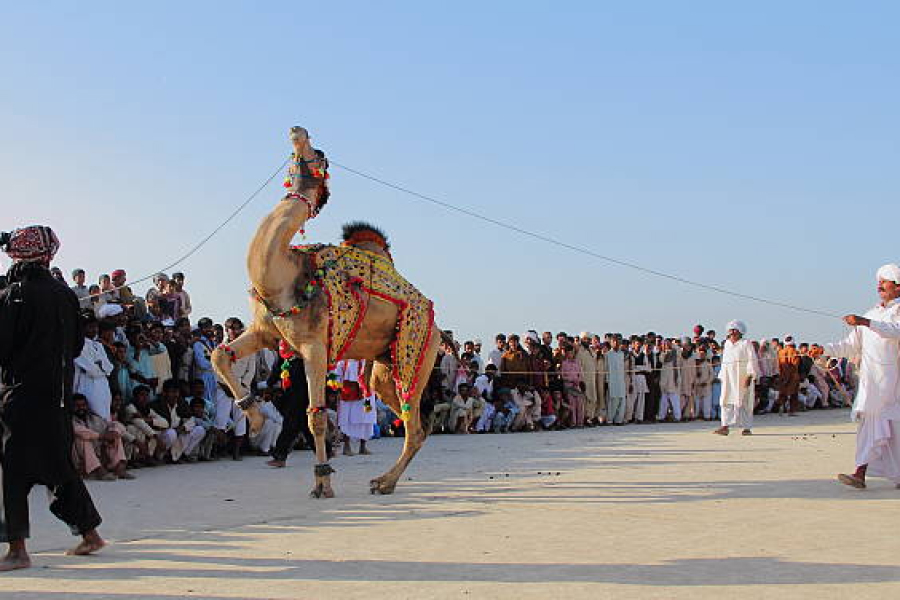Nestled amidst the mesmerizing dunes of the Cholistan Desert, a vibrant spectacle unfolds every February. Chan Peer Festival is a mesmerizing celebration that transcends religious boundaries and embodies the spirit of unity and shared heritage. For seven consecutive Thursdays, the air reverberates with the rhythmic sounds of Sufi music, captivating performances, and joyous laughter, making it one of the most popular festivals in South Punjab. Explore the beauty of enchanting Chanan Peer Darbar Mela Cholistan.

FAQS:
Where is Chanan Peer Mela?
The Chanan Peer Mela takes place in the Cholistan Desert, approximately 65 kilometers away from Bahawalpur in South Punjab, Pakistan. The festival is held near the shrine of Channan Pir, a revered Sufi saint who lived in the 12th century.
What is the history of Channan peer?
Channan Pir, a 12th-century Sufi saint, was born to a Hindu Raja but converted to Islam. He preached tolerance and unity, inspiring many to convert. His shrine in the Cholistan Desert became a pilgrimage site, eventually giving rise to the Chanan Peer Mela, a celebration of shared heritage.
Honoring the Sufi Saint: Channan Pir
The festival revolves around the revered figure of Channan Pir, a Sufi saint who lived in the 12th century. Beloved for his holiness, wisdom, and compassion, Channan Pir preached a message of tolerance and acceptance, attracting followers from all walks of life, regardless of religion. His shrine, located 65 km away from Bahawalpur, serves as the focal point of the festival, attracting thousands of devotees who come to pay their respects and seek blessings.

Local History of Chan Peer Darbar Mela:
The Chan Peer Darbar Mela, held in the Cholistan Desert near Bahawalpur, Pakistan, boasts a rich history steeped in faith and cultural exchange. It celebrates the life of Channan Pir, a revered Sufi saint of the 12th century. Legend claims he was born a Hindu prince, prophesied to convert to Islam, and left in the desert. Miraculously surviving, he embraced Islam and spread a message of unity among the local communities. The festival, initially a small gathering of devotees at his shrine, has evolved into a vibrant celebration spanning seven Thursdays in February. Today, it attracts thousands of Hindus and Muslims who come together to witness traditional performances, marvel at local crafts, and participate in Sufi rituals, reaffirming their shared heritage and Channan Pir’s enduring legacy.
A Tapestry of Culture and Tradition:
The Chan Peer Festival is a kaleidoscope of cultural expressions. The desert sands transform into a vibrant stage showcasing traditional dances, folk music, and captivating storytelling sessions. Renowned Sufi singers mesmerize the audience with their soulful melodies. At the same time, skilled artisans display their craftsmanship in intricate embroidery, pottery, and jewelry. A highlight of the festival is the camel race, a thrilling spectacle showcasing the agility and strength of these majestic creatures.
Beyond Festivities: A Journey into the Cholistan Desert
The Chan Peer Festival offers an opportunity to experience the unique charm and beauty of the Cholistan Desert. Visitors can embark on thrilling jeep safaris, explore the abandoned villages, and marvel at the breathtaking dunes that stretch as far as the eye can see. The festival also provides a glimpse into the nomadic lifestyle of the local communities, offering a chance to understand their traditions and customs.
A Celebration of Unity: Hindus and Muslims Come Together
One of the most remarkable aspects of the Chan Peer Festival is the harmonious blend of Hindu and Muslim communities. The festival transcends religious differences, fostering an atmosphere of unity and respect. People from both faiths come together to celebrate the legacy of Channan Pir and share in the joy of the festivities. This spirit of inclusivity makes the Chan Peer Festival a beacon of hope and understanding, reminding us of the power of shared cultural experiences.
It is just a glimpse into the magic of the Chan Peer Festival. As we journey further into this captivating experience, we will delve deeper into the cultural nuances, explore the history and traditions, and unveil the unique charm of this unforgettable celebration.

A Journey into Rituals, Traditions, and Artistic Expressions:
The Chan Peer Festival is more than just a vibrant celebration; it is a window into the rich cultural tapestry of South Punjab. Woven into the festivities are deeply ingrained rituals, time-honored traditions, and diverse forms of artistic expression that reveal the heart and soul of the region.
Immerse Yourself in Sufi Rituals:
The spirit of the festival is deeply rooted in Sufi traditions. Devotees gather at the shrine of Channan Pir to offer prayers and participate in dhikr, a ritual dance accompanied by rhythmic chanting of Sufi hymns. The air fills with spiritual energy as participants surrender to the divine through music and movement. Witnessing these rituals allows visitors to experience the profound sense of peace and tranquility that lies at the heart of Sufi teachings.
Step Back in Time with Traditional Performances:
The festival stage comes alive with an array of traditional performances that transport visitors back in time. Bhangra, a vibrant dance form known for its energetic steps and colorful costumes, fills the air with joy and enthusiasm. The mesmerizing Jhoomar, performed by women, captivates audiences with its graceful movements and intricate footwork. Folk singers enthrall listeners with their soulful renditions of tales from local folklore, preserving the region’s rich oral history.
Witness the Skill of Local Artisans:
The Chan Peer Festival provides a platform for local artisans to showcase their exceptional skills. Visitors can marvel at the intricate embroidery adorning traditional clothing, the delicate craftsmanship of pottery and clay sculptures, and the vibrant beauty of handmade jewelry. These artistic expressions not only reflect the region’s cultural heritage but also provide a livelihood for many families.

Experience the Joys of Tent City:
The festival grounds transform into a bustling tent city, offering a unique opportunity to experience the nomadic way of life. Visitors can stay in traditional tents, enjoy authentic local cuisine, and engage in lively conversations with local communities. This cultural exchange fosters understanding and appreciation for the diverse traditions that make the region so vibrant.
More than just entertainment, the Chan Peer Festival’s cultural tapestry offers a window into the soul of South Punjab. It is a celebration of shared heritage, artistic expression, and spiritual connection, leaving an indelible mark on all who witness its magic.
A Legacy that Endures: Tracing the Roots of the Celebration
The Chan Peer Festival is more than just a vibrant spectacle; it is a living testament to a rich and complex history that stretches back centuries. The festival’s roots lie in the life and legacy of Channan Pir, a revered Sufi saint whose teachings and actions continue to resonate with people of all backgrounds today.
A Prophetic Birth and a Miraculous Journey:
The story of Channan Pir is shrouded in legend and mystery. According to local folklore, Channan Pir was born to the Hindu Raja of Jaisalmer in the 12th century. A prophecy foretold his conversion to Islam, causing the Raja to abandon the newborn prince in the Cholistan desert. Miraculously, Channan Pir was found and nursed by a deer, symbolizing compassion and divine protection. He eventually grew up to become a renowned Sufi saint, spreading his message of love, tolerance, and unity.
A Legacy of Conversion and Community Building
Channan Pir’s teachings resonated deeply with the people of the Cholistan region, particularly the nomadic communities. He converted many to Islam, but his message transcended religious boundaries. He emphasized the importance of peaceful coexistence, social justice, and respect for all people. This inclusive approach fostered a sense of community and unity that continues to define the Chan Peer Festival today.

The Evolution of a Festival:
The Chan Peer Festival started as a small gathering of Channan Pir’s devotees who came to pay their respects at his shrine. Over time, the festival grew in popularity, attracting people from all over the region and beyond. It became a platform for cultural exchange, economic activity, and religious celebration. Today, the Chan Peer Festival is one of the largest and most significant cultural events in South Punjab, attracting thousands of visitors each year.
A Celebration of Resilience and Hope
The Chan Peer Festival serves as a powerful reminder of the region’s rich cultural heritage and its ability to overcome challenges. The Cholistan desert, once considered a desolate and unforgiving landscape, has become a vibrant stage for celebrating unity and diversity. The festival’s continued success stands as a testament to the resilience of the local communities and their unwavering spirit.
The Chan Peer Festival is a unique blend of history, culture, and spirituality. It offers a captivating glimpse into the past while fostering hope and understanding for the future. As we conclude our journey through this remarkable celebration, we are left with a deeper appreciation for the power of shared heritage and the enduring legacy of Channan Pir. Book your tour of Chanan Peer Darbar Mela Cholistan.

